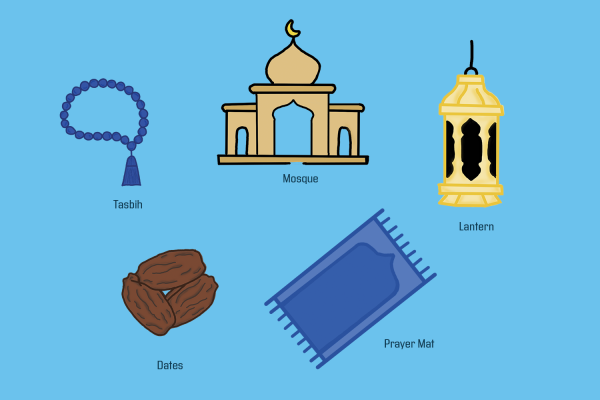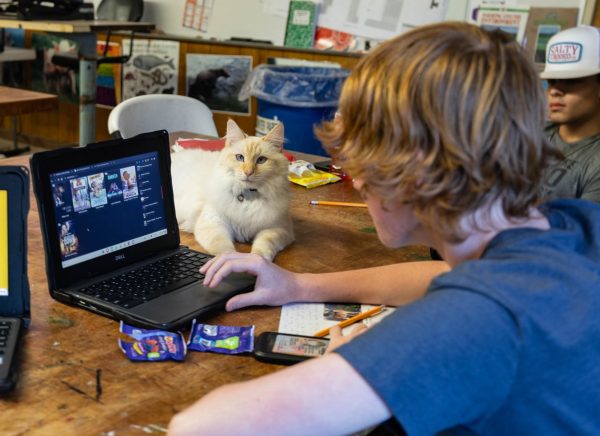Eating away at reality
A student’s journey with anorexia
September 23, 2019
Models with perfect curves, small waists and naturally beautiful features overtake her Instagram feed. “Why can’t I look like that?” She looks in the mirror and is dissatisfied with what she sees. She’s nothing like any of the models she’s seen on social media. Maybe if she skips a couple of meals she could look like them. After all, it’s only a few meals, what could go wrong?
In 2017, Emily Meunier started off her freshman year by wanting to shed a few pounds. She thought maybe a diet would do the job and would help her gain the confidence that she desired. However, this mindset led her plummeting into a common disorder that many teenagers endure on a daily basis, anorexia.
“During freshman year I was concerned about how my body looked because of social media and the influence of others. It started off as me just wanting to lose weight but then it escalated really quick,” Meunier said. “It became an addiction to lose weight. Everytime I lost a few pounds, I wanted to lose more and more. In the morning I would eat some yogurt and a few raspberries, but my mom caught on to it and tried to help. I’d skip lunch and would only eat a few bites at dinner, sometimes I’d even try to hold food in my mouth and spit it out later.”
Numerous disorders that teenagers endure are usually influenced by other people, such as social anxiety, depression, behavior disorders and in this case anorexia nervosa. Anorexia results in a person becoming obsessed with losing weight whether it’s by excessive exercise, low food intake or starvation. Eating disorders are a lot more common than one may think. Every 62 minutes a person dies from the direct result of an eating disorder.
“No one ever talked about my weight. They never said anything. I just wanted to do it for myself because I thought I would impress people if I was skinnier,” Meunier said. “I remember that one time, someone hugged me and mentioned to me that I had lost a lot of weight. I just assumed that it was a good thing and kept on doing it.”
A recurring issue for people is that they are unsure of how to approach a person with an eating disorder. Typically, those without experience with eating disorders will find the urge to comment on how skinny they’ve become or how sick they look. People also want to question why they don’t want to eat. However, anorexia is a puzzling illness that goes into a complex biological and genetic viewpoint, making it illogical to the person with the disorder. Instead, complementing the person on something other than their physicality, becoming their friend or even doing something as simple as smiling at them in the hallway can create a bond between the pair. They said if I don’t go to the hospital or an inpatient facility to get help that I would die in two weeks. — Emily Meunier
“At the end of the school year, I went to my doctor and they realized how much weight I had lost. I was down to 96 pounds,” Meunier said. “I had no other choice but to go. I was forced to get help at the time, but I’m really glad I did it.”
The number of teenagers with anorexia is growing worldwide. In America alone, by the time girls are 17, over 78% of them have stated that they are unhappy with their body. There is a growing amount of uplifting women throughout different social media platforms who encourage young women to love their bodies and to not be ashamed of any disorders they may be battling.
“I was inspired by influencers and YouTubers on social media that went through the same thing. The Youtuber Jen Brett’s videos helped me a lot,” Meunier said. “That’s really what helped me gain weight back. I needed to see how they got through it and how they live out their lifestyles. I hope to do that for other people too. I like to spread body positivity now because I know a lot of people go through disorders and they go unnoticed.”
Recovery is not something that can happen with the snap of two fingers, but it’s a process that is vital to a person’s journey. Some are quicker in the process while others are more dragged out, but in the end, everyone is working towards the same goal of self acceptance.
“Don’t be afraid to try and tell someone what you’re going through. I know it can be difficult because you don’t want anyone to find out because you want to keep doing it,” Meunier said. “If you are struggling with an eating disorder, please reach out to someone you trust and seek help, even if it may seem hard.”





















Kylee Jo Braley • Sep 27, 2019 at 7:06 pm
Great story! Really hope this influences others that have the same problem or have had to deal with such as this, to get help!
Suvwe • Sep 27, 2019 at 4:19 pm
Such a great story! The subject matter was handled so well